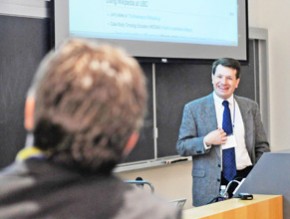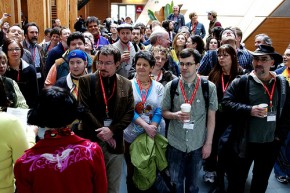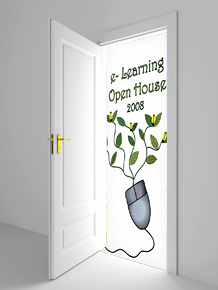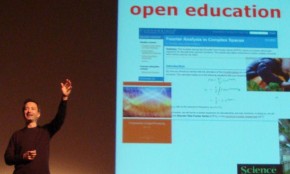Making Wikipedia Work in the Classroom
The common perception is that Wikipedia makes professors shudder; it is supposedly not a credible source, and its use in education is limited. While there is a need to be cautious when using any type of technology, some instructors are out to change Wikipedia’s negative image.
Computing as Poetry with Gardner Campbell
Computing, like the world of poetry, stimulates the imagination and is something best experienced personally. Instead of using words to convey thoughts and ideas, computing employs a variety of tools such as images, graphics, sounds and videos to create an experience beyond even while it augments the imagination.
Northern Voice 2008
On the Northern Voice site, the event is described as “a two-day non-profit personal blogging and social media conference”. Although accurate, this definition doesn’t begin to capture the outcome of bringing some of the most enthusiastic, creative and passionate bloggers together under one roof.
A Great ‘08 Open House!
With 20 presenters and over 200 visitors, the 5th Annual e-Learning Open House at Sage Bistro on March 13th was a wine & cheesey event with poster displays on everything from online teaching to dental hygiene!
A Certain Chemistry – The Abacus Project and WebCT
For students to appreciate the complexity of real world research they must be exposed to authentic learning experiences and able to use the same tools that modern researchers deploy. The Abacus Project, provides an environment to connect students to research-grade software like never before.
Connexions: A New Way to Share Ideas and Resources
Richard Baraniuk wanted to reach the world through a connected, up-to-date community of open education. Through his project, Connexions, he is changing the way authors, educators, and learners share resources, and is transforming the world of textbooks.
Building an Online Community: Using Student Online Behaviour to Guide Teaching Practice
As an instructor, have you ever created an online discussion area, encouraged discussion amongst the class, yet find that almost no one participates? Whether it’s a distance education or an on-campus course, more and more instructors at UBC are using online components like WebCT CE and WebCT Vista to supplement their teaching.
HELP IS AVAILABLE: Student Engagement and the Transition to the Professional Workforce
Gone are the days where one stays with the same company for their whole life, so post-secondary institutions must start preparing students for a life of perpetual change. Post-secondary institutions need to engage students in enriching educational experiences while providing a supportive campus environment where resources can easily be found and where students can learn about making the transition into the professional workforce.
Help, I'm an Online Learner and Don't Know What to Do!
The four panelists walked through the Orientation to Learning Online website, which has been developed to give students and instructors a valuable resource to learning online. Discussion revolved around the benefits of collaboration and content-sharing in the context of UBC’s Orientation website, and ways in which faculty and students can make use of its content.
Q&A – LCIN Listens, and Shares
The LCIN stands for “Leading Campuses International Network”. The LCIN (“listen”) part is kind of meant to be fun…this is a group that has some good ideas to share and wants to hear more from other practitioners. When we thought about the name, we wanted to capture the qualities of the institutions represented in the program.










